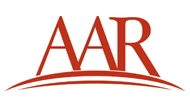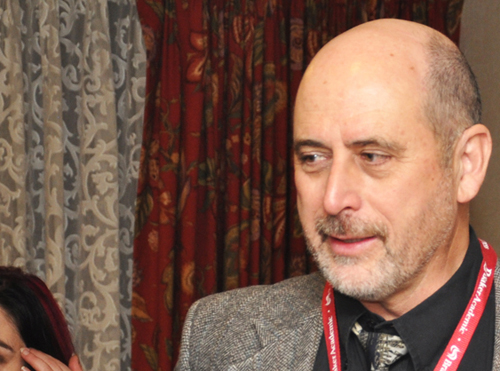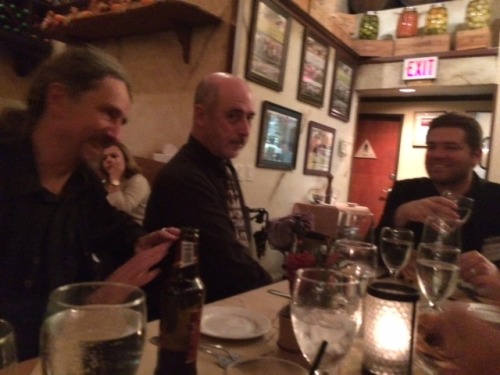The American Academy of Religions held its annual meeting in sunny San Diego, California from Nov. 22-25. The event attracted thousands of professors, students, writers, religious leaders and others from across the globe to participate in workshops, lectures and events related to religious studies and theology. In attendance and presenting were a growing number of Pagans.
 “The AAR annual meeting is a huge intellectual energy infusion, not to mention a social occasion with Pagan Studies scholars from around the world,” said Chas Clifton, co-chair of AAR’s Contemporary Pagan Studies Group. “There are literally dozens of sessions happening at any one time-slot, so people are always having to compromise.” He added that the Pagan-focused programming, which began in 2005, attracts an average of 40-50 attendees per session, which he called “respectable for a small sub-field.”
“The AAR annual meeting is a huge intellectual energy infusion, not to mention a social occasion with Pagan Studies scholars from around the world,” said Chas Clifton, co-chair of AAR’s Contemporary Pagan Studies Group. “There are literally dozens of sessions happening at any one time-slot, so people are always having to compromise.” He added that the Pagan-focused programming, which began in 2005, attracts an average of 40-50 attendees per session, which he called “respectable for a small sub-field.”
The sessions, which were run in part or in whole by the Pagan Studies Group, included such topics as, “The New Animism: Ritual and Response to the Nonhuman World” (Michael Houseman, Ecole Pratique des Hautes Etudes); “Evolving or Born this Way: Conversion and Identity” (Hannah Hofheinz, Harvard University); “New Paganism(s) around the Globe” (Chas Clifton, Colorado State University); “Animism and Paganism: The Dialog Continues” (Jone Salomonsen, University of Oslo) and “From the Charmed Circle to Sacred Kink: Theorizing Boundaries in Religion and Sexuality.” And those are just a few highlights.
Dr. Wendy Griffin, Professor Emerita and Chair of the Department of Women’s, Gender & Sexuality at California State University and Academic Dean of Cherry Hill Seminary said, “As the founding co-chair of the Pagan Studies group at the AAR years ago, I have seen the attendance grow with real pleasure. The reception has always been positive.”

Co-Chair of AAR’s Pagan Studies Group [Courtesy Photo]
Clifton added, “The academic study of Paganism is not about either explaining Paganism to others or teaching Pagans how to be better Pagans. For the latter, I suppose you go to PantheaCon.” The discussions at AAR fall more into the academic realms of mapping emerging practices, presenting trends or vital discourse.
M. Macha Nightmare has been attending AAR off and on since 1998. She said, “I [went] mainly to support the group that was then formulating the implementation of a Pagan Studies section … Since that time, I’ve joined the Academy and have attended as many meetings as possible. During that time, I’ve seen the proposals and acceptance of the Pagan Studies section flourish. ”
Part of her connection to AAR is through her work with Cherry Hill Seminary (CHS). Nightmare said, “In fact, on my way to the 2009 annual meeting in Atlanta, I encountered Wendy Griffin in the women’s room of the Dallas Airport where we both had a layover on our trips … She asked what I had been up to and I replied that CHS was seeking an Academic Dean.” After several discussions with Director Holli Emore, Griffin was hired. Now, Griffin admits that one of her motivations for going to AAR is to “promote Cherry Hill.” She added, “This year, I believe, we found 2 new international students.”
People attend AAR for a variety of reasons. Amy Hale, Ph.D., Undergraduate Director of Instructional Technology and Teacher Excellence at Golden Gate University, has been “delivering workshops for AAR’s Employment Services on the theme of career transition away from academia.” Hale also sits on the Pagan Studies Steering Group. Of this year’s event, Hale said:
AAR can be huge and overwhelming but the conversation is lively and stimulating. I particularly loved the Esotericism in African American Religion session which included some excellent scholarship that rightfully expands the boundaries of Western Esoteric Studies.
Jeffrey Albaugh attends, in part, to help his own work for the Conference on Current Pagan Studies. He said that attending AAR “helps in how [he] thinks about how the conference is run.” He added, “My work occupies the confluence of psychology and religion, so attending AAR offers me new perspectives to consider.”
Dr. Sabina Magliocco, Professor of Anthropology at California State University, only attends on occasion since her “primary professional association is the American Folklore Society (AFS).” Fortunately, this year’s meeting was close to her home and, therefore, she was able to easily attend. Additionally, Magliocco was invited to be a respondent on a panel about folkloristic approaches to the study of religion. She said:
I also had recent research results from my project “Animals and the Spiritual Imagination” that I wanted to present and get feedback on. AAR fits with my work as a folklorist and anthropologist because of my focus on vernacular religion and expressive culture. I can network with others who share those specific interests, as well as ones in ritual studies, Pagan studies, and new religious movements.
![Australian Professor Douglas Ezzy presenting [Courtesy J. Albaugh]](https://wildhunt.org/wp-content/uploads/2014/12/photo-3-e1417541813103-413x500.jpg)
Australian Professor Douglas Ezzy presenting [Courtesy J. Albaugh]
Israeli Ph.D candidate Shai Feraro said, “It was first time at AAR, after attending several conferences in Europe. I decided to attend the annual meeting due to its status as the largest and most important conference dedicated to the study of religion and spirituality.”
Douglas Ezzy, Ph.D, associate Professor of Sociology at the University of Tasmania in Australia, was attending the annual meeting for the 4th time. He said, “The AAR is a very important forum for me as a Pagan Studies scholar. It is one of the few places where I can meeting a large group of other academics who share my interests and have a detailed familiarity with the Pagan Studies literature.” Ezzy’s paper and recent work focus on “Relational Ethics, Ritual and the New Animism.”
Of this year’s AAR meeting, Ezzy said, “I heard some wonderful papers on ritual studies, mysticism, gender and religion and Paganisms. I also renewed some friendships and developed new ones.” That sentiment was echoed by several of the attendees. Feraro noted that a Pagan Studies group dinner was held at a local restaurant, where he was able to finally meet some American Pagan scholars whose books influenced his own research.

Douglas Ezzy, Chas Clifton and Shai Feraro at Pagan Studies group dinner
Hale agreed, saying “Another highlight is spending time with my colleagues, who are cherished friends. AAR just creates community.”
Next year’s American Academy of Religions annual meeting will be held in Atlanta Nov. 21-24. Clifton says that, over the next few weeks, the organization will be setting the 2015 themes. The call for papers will be issued in January.
The Wild Hunt is not responsible for links to external content.
To join a conversation on this post:
Visit our The Wild Hunt subreddit! Point your favorite browser to https://www.reddit.com/r/The_Wild_Hunt_News/, then click “JOIN”. Make sure to click the bell, too, to be notified of new articles posted to our subreddit.
This was a wonderful post, Heather. Thank you! By way of correction, the workshops I deliver are actually focused on career transitions AWAY from academia. My sincere apologies if I mistyped.
That does change things doesn’t it? I modified the sentence and thanks for sharing your thoughts on AAR for the article.
Lovely article. It was great to read the perspectives of so many participants, past and present.